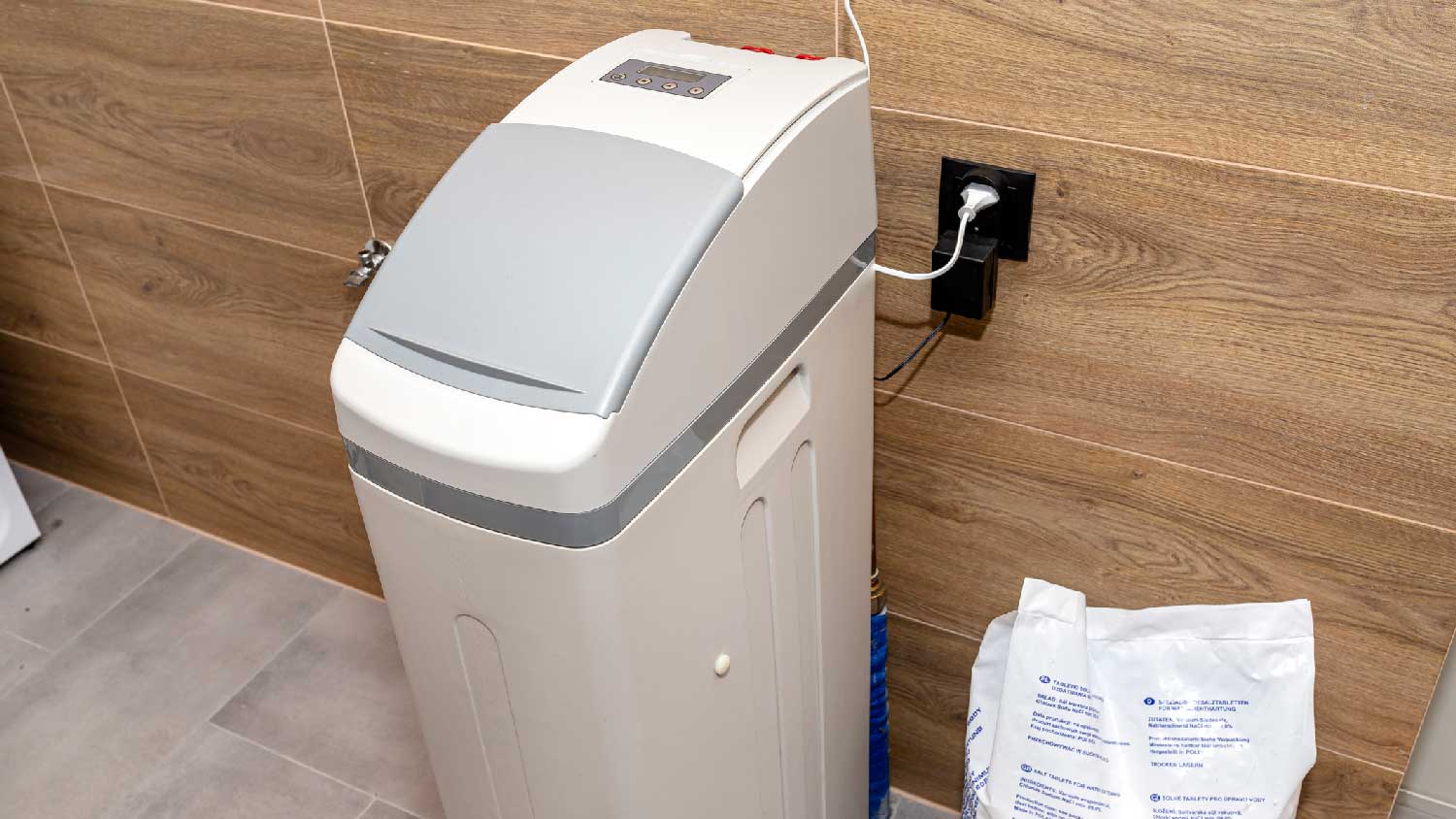3 Effective Ways to Remove Hard Water Stains From Glass
Turns out hard water stains aren't hard to clean


Hard water can be beneficial for drinking, but it can also create unsightly stains on bathroom surfaces and dishes. The minerals in hard water make it less than obvious to know how to remove hard water stains from glass. Fortunately, you can easily clean those stains with a homemade hard water stain remover made of vinegar or baking soda (or a commercial cleaner). Here’s how to get started.
Why Hard Water Is a Problem on Glass
When you have hard water, droplets containing dissolved minerals cling to the surface of glass. As the water evaporates, the dissolved minerals, namely calcium and magnesium, stay behind. These deposits build up into frustrating hard water stains on your once-crystal-clear glass.
Whether it’s glass dishes, windows, or shower doors, hard water stains can detract from the appearance or even reduce the integrity and longevity of glass across your home.
How to Remove Hard Water Stains From Glass
Baking soda, vinegar, or commercial products can be lifesavers for getting hard water stains off of glass. Here are three different ways to ban the scale for good.
Use a Vinegar Solution
Vinegar is a naturally powerful acid that can dissolve mineral deposits and leave your glassware looking crystal clear. Here’s how to use it to clean hard water stains.
Mix a solution: Add equal parts white vinegar and water to a clean and empty spray bottle and stir it up. You can also mix the solution in a bucket, but a spray bottle will make it easier to cover large areas like shower doors.
Apply it to the stain: Spray the cleaning solution directly onto all visible hard water spots. If you're cleaning a shower door, start at the top and consider placing a towel at the base to catch any drips. Let the solution sit for 30 minutes to give it time to break up the stains.
Gently scrub the glass: After letting the solution sit for 30 minutes, use a wet microfiber cloth, soft sponge, or soft-bristled brush to gently scrub the hard water spots using circular motions. You can also use an old toothbrush for tough-to-reach areas. Just make sure not to scrub too hard.
Rinse and dry the glass: Once you scrub all of the hard water stains, rinse the glass with clean water, then dry it with a microfiber cloth.
Use a Vinegar and Baking Soda Paste for Tougher Stains
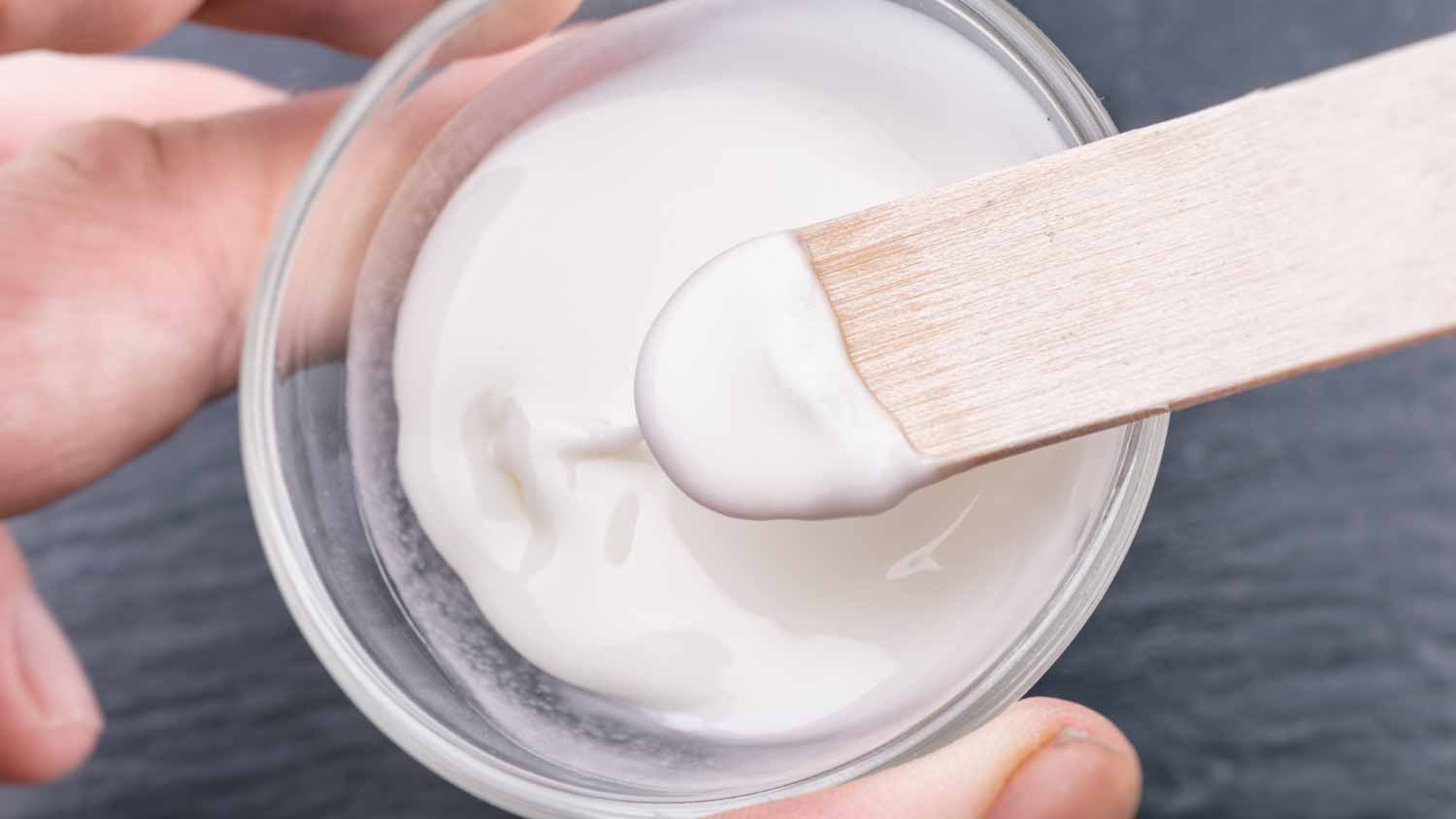
You can harness the powerful combo of vinegar and baking soda if a vinegar-only solution doesn’t cut it. Follow these steps to banish particularly troublesome hard water stains from glass:
Mix a paste: Mix a solution of three parts baking soda to one part water to create a gentle abrasive paste. Keep mixing and adding more baking soda or water until the paste reaches a toothpaste consistency.
Apply vinegar again: Set the paste aside for a moment. Use your spray bottle to apply more of the vinegar and water mixture to the remaining hard water spots. Let it sit for 30 minutes.
Apply the paste: Use a microfiber cloth, soft sponge, or soft-bristled brush to apply the baking soda paste to the stains, gently scrubbing in a circular motion. Let the paste completely dry, which takes about 10 minutes.
Apply more vinegar and gently scrub again: Once the paste is dry, spray more vinegar onto the hard water stains, letting it sit for a few minutes before scrubbing both the vinegar and paste away using the cloth, sponge, or brush you used previously.
Rinse and dry: Finally, rinse the entire area with clean water and dry it completely using a squeegee or a microfiber cloth.
Use a Commercial Hard Water Stain Remover
If you need something more powerful than homemade mixtures, you can try a commercial hard water stain remover. Use caution with these because they can damage some surfaces, such as wood, stone, carpet, copper, and painted surfaces. Always follow the manufacturer instructions carefully, and wear protective gear, like gloves and a face mask, while using commercial hard water stain removers.
Ventilate: Open doors and windows to ventilate the area and put on protective gear.
Apply and wait: Apply the stain remover to the stain using a spray, brush, sponge, or other application method and wait as directed by the manufacturer (often three to five minutes).
Rinse and dry: Rinse the solution with cold water. Completely dry the glass with a cloth or squeegee.
How to Prevent Hard Water Stains on Your Glass
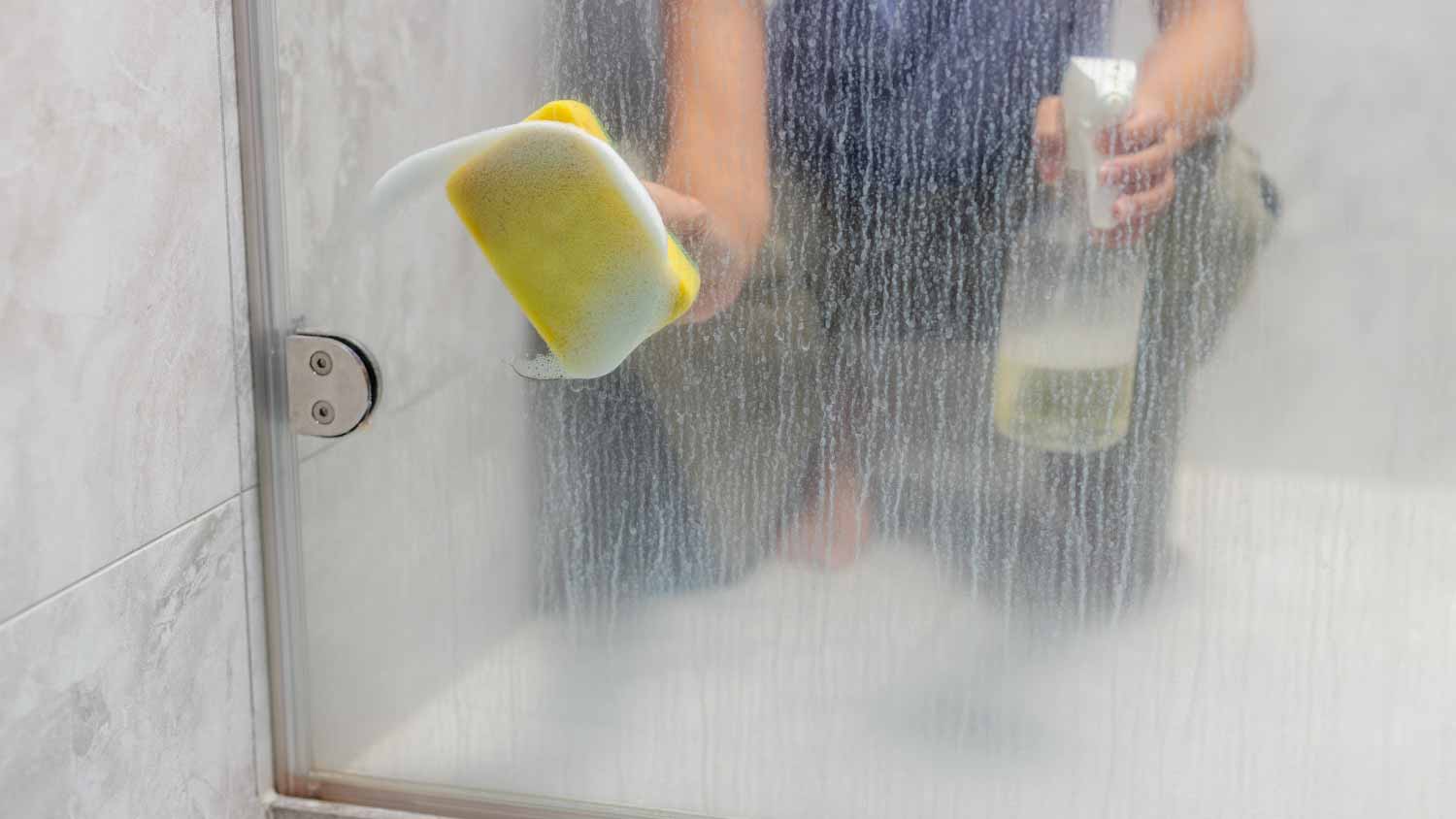
To decrease the amount of time you have to scrub hard water stains away, make it a habit to stay on top of it. Wiping down your surfaces after use and cleaning them weekly with a white vinegar solution can keep hard water spots at bay.
For a more long-lasting and effective way to prevent hard water stains, install a water softener. Water softeners attach to your home’s water line to remove mineral content in the water before it reaches the tap.
“Soft water makes soaps and detergents more effective, reducing the amount needed to clean surfaces, clothes, and even your body.”
— Kenton Jones, Certified Water Specialist & Vice President of Operations at Multipure, Las Vegas, NV
DIY vs. Hiring a Pro
Most homeowners can clean hard water stains themselves, so there's no need to call a pro for this job. But if hard water is causing major issues in your home, such as deteriorating your plumbing, you should call a local water specialist to install a water softener for you. Water softeners cost $200 to $6,000 to install, depending on the size and complexity of the system.
Frequently Asked Questions
Hard water stains are caused by hard water. Hard water contains a lot of minerals, like calcium and magnesium. When water on your glass surfaces dries out, the minerals stay behind and stick to the glass. This results in a residue that looks like white cloudy or streaky spots. Call a pro to install a water softener to banish hard water problems.
The most accurate way to determine whether you have hard water is to purchase a water test kit from a hardware store or send a tap water sample to a lab. But there are some signs you can look out for without professional testing. For instance, if you're consistently dealing with mineral stains on your glassware, windows, and shower doors, you're likely to have hard water. Hard water can also make it harder to lather and rinse soap, so if you're struggling to work up a good lather in the shower, hard water might be the culprit.
Hard water stains can permanently damage your glass if left untreated. The minerals dissolved in the water can etch the glass, causing long-term damage and affecting the overall integrity of the surface. Luckily, it is pretty simple to remove hard water stains by using vinegar, baking soda, or commercial cleaners.


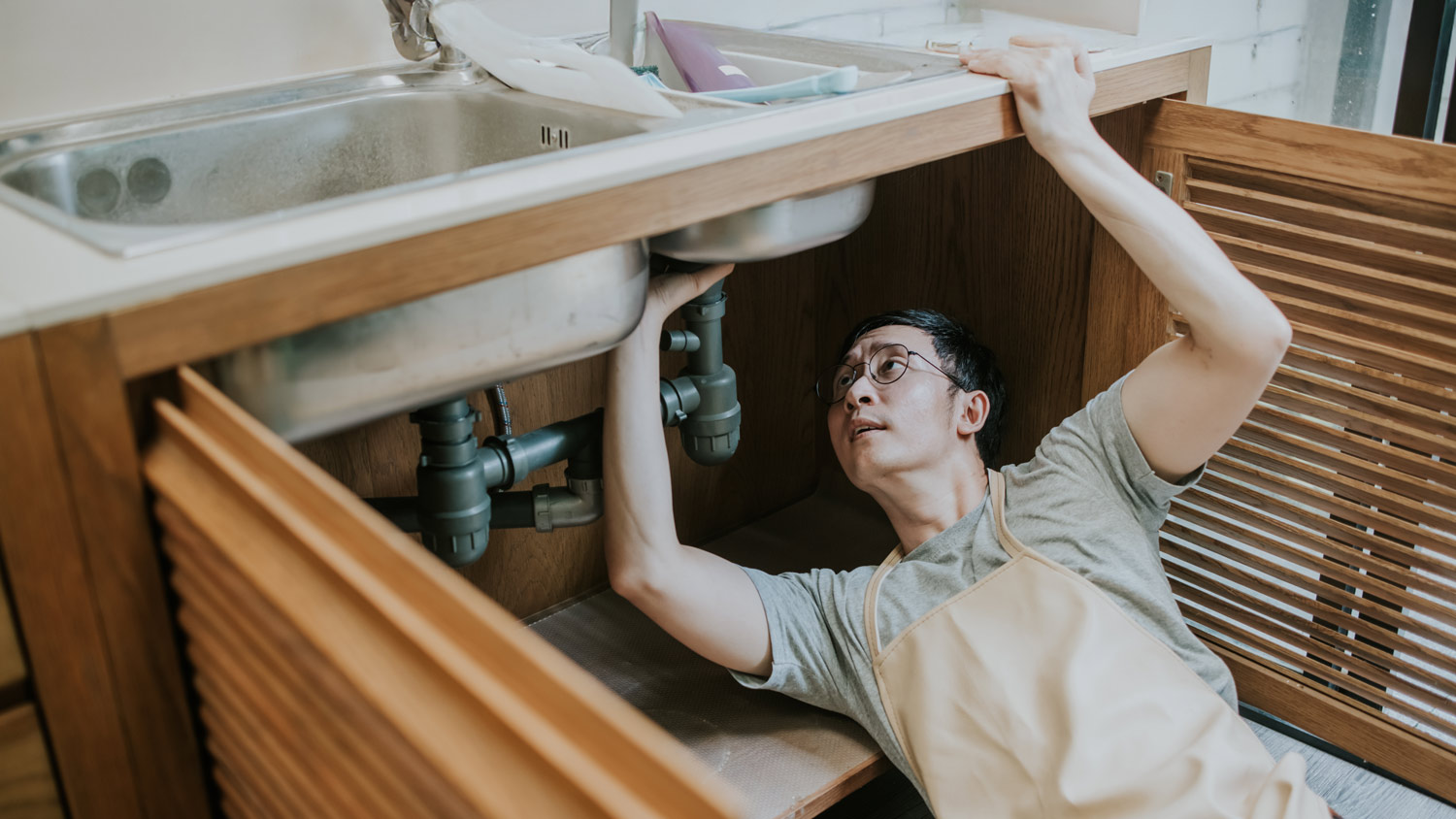

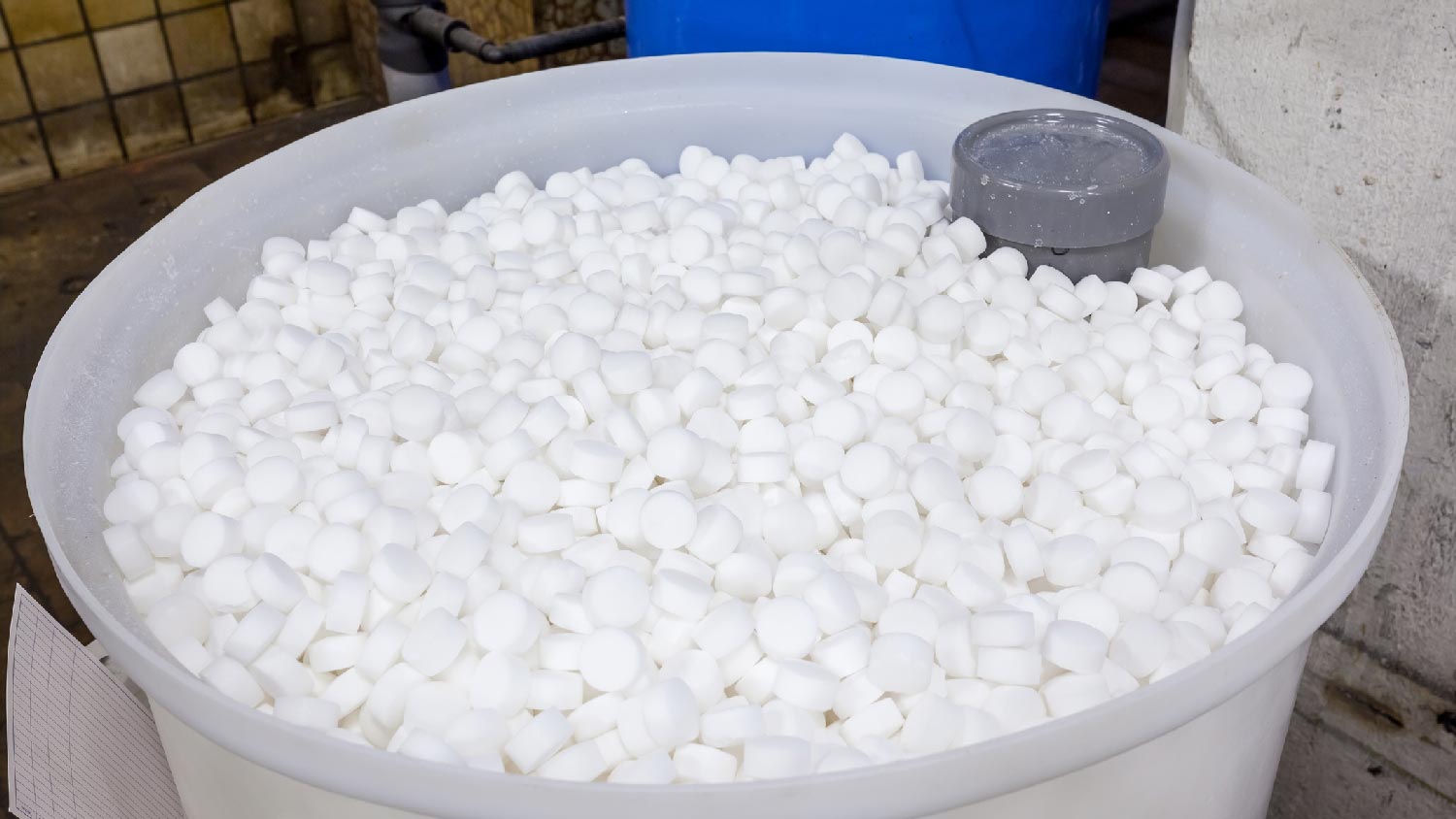
- How to Remove Hard Water Stains From 5 Different Household Surfaces
- How to Clean a Toilet with Hard Water Stains
- How to Tell If You Have Hard Water: 10 Telltale Signs
- Can Hard Water Ruin Your Appliances?
- A Water Softener Can Help Your Appliances Last for Years Longer
- What to Do About Hard Water in Your Washing Machine
- What Is a Water Softener and Is It Right for Your Home?
- How to Prevent Carpet Stains Keep That Keep Coming Back
- 9 Ways to Make Homemade Cleaners to Spruce Up Every Room in Your Home
- What to Use to Clean Carpets Like a Pro



